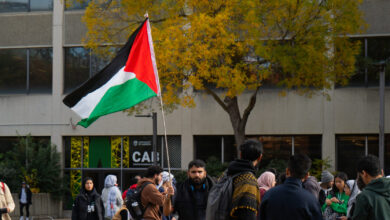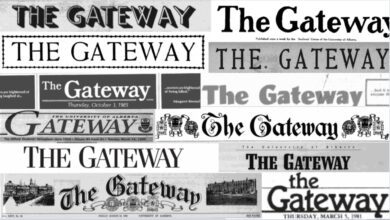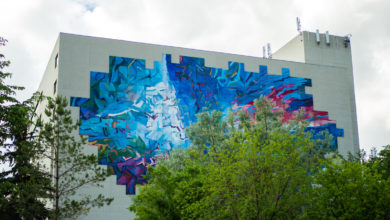From the archives: Wartime letters to the editor
During the World Wars, copies of The Gateway were sent to soldiers in Europe, and some soldiers sent letters to the editor in return.
 Glib Albovsky
Glib AlbovskyThe Gateway was founded in 1910, only four years before World War One began. It continued to publish through the First and Second World Wars and sent copies of the paper to the front lines. The Gateway said in 1917 that “our object, primarily, in publishing the paper this year is to forward it to the front.”
Below are some of the letters to the editor that The Gateway received during both World Wars. Many of these letters were sent from Europe by those fighting in the war. This is a small slice of history, of the thoughts of those at war, of the ongoing discourse happening on and off campus, and the push for a better world.
The following is an extract taken from a card sent by A. E. Metcalf who is fighting in France in the 31st Battalion.
Sent on October 8, 1915 from somewhere in France
Received on November 1, 1915
“Just now I am in the hospital as a result of drinking poisoned water. The crucial moment has past, however, and I expect to rejoin my unit in a day or so. The other Varsity lads are not far from us here, but we never see anything of them.”
“D” Company, 31 Battalion
Army P.O. London, England
Whittington Barracks, Lichfield
Sent on December 9, 1917.
Received on January 10, 1918.
I am writing with my note paper upon your issue of the Gateway, the first, I believe of the season. I congratulate and thank you and your staff for so fitting an issue and so forcible a reminder of university life.
But first I must explain the above address. Back in the summer I set moving those influences which have taken me from the Canadians to the Imperials. The above is an officer cadet battalion and the course lasts till next March, when I hope to get away to one or other of the fighting fronts.
So many of your subscribers give you information first hand of their doings in the actual conflict, that I feel I know no reason for opening up the subject which is so terribly present with us, and with which I have had no actual acquaintance. Yet on the other hand I hardly know how to desist. In barrack life you run with the multitude; from week to week you drill and hear lectures, you polish and clean up and everyone around you is doing the same; you become a link in a great chain, the ends of which are beyond your vision, but you feel the strain in your muscles. Then you read a speech from Lloyd George or from President Wilson, and you feel your individuality return and you stand apart again with the fire of the great purpose burning in your brain. Have you not felt this big business over here to be your own concern? It is something like the effect of the rum ration, which one hero told me made him feel as though he could fight the German army himself. Strange sensations and strange mental experiences are produced in war. You find yourself reaching back for the elements of civilian life while at the same time your eyes are set on the Cambrai front and your wish to grasp some glory there. So Janus-like, you stand. You know how in your boyhood days, you read the heroic deeds of past ages and conjured up in your mind’s eye a mental picture of the hero; now in the time when heroes actually exist you fail to fit the hero before you into your reading. I sit beside a fellow in the Mess who wears a DCMMM, the French Coix du Guerre and some Russian decoration, but — I feel ashamed to express it — he seems just an ordinary soldier.
Trusting you all will have a prosperous session this year, and if I am not too late, that you have a happy Christmas.
I am yours sincerely,
H. R. Leaver
Cadet
Received October 20, 1939
We wish to call attention to the text and implication of a short news item that appeared in the Oct. 2 issue of The Gateway. Probably most readers overlooked it, for it was near the bottom of the third page and consisted of only two sentences. Those who did read it, however, must have done so thoughtlessly, else there had surely been some murmur of protest raised before this.
The item stated, in effect, that the activities of the campus German club were to be suspended indefinitely for reasons which should be “perfectly obvious” to all students at the University.
Perhaps we are rather duller than most students, but we cannot see that reasons are at all obvious, and the more we consider the matter, the more senseless it becomes. In fact, if there were any reasons at all, they would certainly also apply to the German language courses being taught at the University, and the courses would have to be suspended also. Then, to be consistent, we would have to effect a “blood purge” in the library and make a bonfire of all the work of Luther, Lessing, Schiller, Goethe, Uhland, Hauptmann, and score of others. By the time we finished that, we would probably have persuaded ourselves that English is the only pure language and German is only a degenerate and perverted imitation of it, and no doubt we would also be urging our politicians and militarists to impose our protections upon the Canadian minority in the United States.
If there were any possibility that singing a few German love songs, reading a German poem or staging a German play, and drinking a Tuckshop coffee would make Nazis of us, then there would be some point in stopping the club. The only effect these things can have, however, is to give us some insight into ordinary German mind and a more sympathetic understanding of the German people as distinct from Hitler and Hitlerism.
It is true that our country is at war with Germany, and that most people in time of war are carried away with insane hatred for those people who happen to be their enemies. If sane, intelligent attitude is to be preserved anywhere, it should be most evident in the University. No doubt there will be narrow-minded criticism from a few jingoists, but we must not mind that if we are to give the public an example of what we know to be right.
We are at war with Hitlerism; are we, then, to let out actions be governed by notions, which are the essence of Hitlerism?
R. H. Blackburn
Received December 20, 1940
I was just mulling over a pile of old letters and papers and came upon the copy of the alumni paper, “The Trail,” so just decided to write and say a few words of what it’s like to us over here, and how nice it is to hear from home, even to see and read some of the names from Home in the Trail.
We have been in this country nearly three months and it is grand — everyone treats us as if we were old friends. The Canada badges on one’s shoulders are like an “open sesame” to go anywhere. Our troops have also had a grand time of it because the English put themselves out so much for them.
The country is everything we ever heard of it bein. We have done considerable touring around, and in the course of it have visited many interesting places, such Winchester, Dover, and Windsor. Also during leave I had the opportunity of being in London for a few days and seeing a lot of old interesting places there and the damage done to them and the city by the bombs.
I saw St. Paul’s Cathedral a few hours before it was bombed the second time, and the bent sword of Richard the Lion Hearted, and Westminister, and walked through the old Lawyers section all full of queer little alleys and houses, and all the Law inns.
At Westminster we visited the Cathedral, the ancient burying grounds of the kings and queens of England — not used for some hundreds of years now; also went through the Westminster Bishops’ Palace and inspected the ruins of the old castles and Bishops’ Palace laid waste by Cromwell’s men; visited the old Winchester College founded by Dr. Williams of Wickman, which every year takes in 70 of the finest young scholars in England for a scholarship education. That is where they wear a straw hat with a coloured band around it — ad toppers on Sunday; where they (the scholars) go on Saturdays and Sundays, I think; anyways it is nine times a week. Some of my class in the Engineering Faculty of ’41 would like to hear about that.
Then at Windsor, myself and three other officers had the good fortune to be touring through Windsor Castle on Sunday when King and Queen were in residence, and when they saw us in the Royal Quadrangle, they stopped and talked to us for about fifteen minutes. They were going out for a drive with the two princesses, and were quite informal. They chatted bout England and then about Canada and their trip there, and then told us that they would be down to see us soon at our training. We had a party of fifty troops with us, and there wasn’t a man of them that would not gladly have forgone a months of pay if necessary for that thrilling experience.
I have several pictures of the group around the car, and the King and Queen taken by ome of our men at the time, and they are priceless souvenirs.
Well I must not take up any more of your time, so I’ll thank you for your kindness in sending me the Trail (darn these capital letters — the Engineering coming out in me I supposed).
One little bit of information I can give you. You have listed in the Trail undergraduates serving in the CASF one by the name of Donald Munro. He is now a 2nd Lt. in my unit and although still in Canada now, will be here sometime soon I think. He joined as a private in September 1939, and held the rank of Platoon Sergeant Major till appointed to a commission last August.
Lt. Don C. Matthews of my unit, and previous Ag. Student, is now on the staff of one of the formations of the Canadian Organization here — naturally too many names and designations to be mentioned here.
I can think of no other news — so I shall leave this; but first I’d like to say that to any and all of our friends at the Varsity we wish a grand and glorious Christmas and a Happy New Year, and hope that we’ll be registered there again next year — after we mop up this mess.
So until then, or until we hear from any of the people at home again, to the University we say “Au Revoir.”
Ed Langston
P.S. I forgot to add that John C. Jamieson, previous Athletic Director at the U of A is here in the same barracks with me. It is nice to be with someone from the Varsity, and “jake” is doinga darn good job. He is on the Y staff, Auxiliary Services.
Also I have seen Jacko Thomas, Andy Lees and although I haven’t seen him, I hear Doug Van Kleel is with these two in the Pioneer Battn.
I have seen John Washburn and Doug Jacquest and a chap by the name of Howarluk — I am not sure of that spelling. They are reinforcements from one of the Edmonton units, and at present, or at least for now are one of the holding companies.
Received November 19, 1943
I have been receiving The Gateway for some time, and thought I’d drop you a line to show my appreciation.
I have been on “ops” down here for several years, but I can remember the good times I had at the good old U of A.
I’m sorry to hear about Marcel Lambert being a prisoner of war now, but I’m afraid there will be lots more like him.
Please forward my Gateway to R.C.A.F. Station, Chatham, N.B.
(Sgd.) F/O C.R. Dixon
Received November 9, 1945
“Time and money spent in training the body to yield a larger interest than any other investment.” Gladstone.
Men in military service all of the world have made numerous requests from the “home front.” Most prominent among these requests have been appeals for sports, equipment, recreational facilities, sporting, news, and radio “sports casts.” Sporting-goods manufacturers have been unable to supply the demand of men in the services. One of the most important phases of military training has been physical conditioning in regard to strength, endurance, coordination, and teamwork. Surely these facts indicate that not only the interests but also the needs of our young men centre around the field of Physical Education.
Many of those no longer with us were able to save lives of their buddies because of a body able to respond to the severance test.
There is, in my estimation, no more fitting symbol of what our men have fought and died for than a place to enjoy activities both as a spectator and a competitor; a place where troubles are disregarded for a period of enjoyment; and a place where people can be training to look after the needs of our youth in matters of health and physical education. A Physical Education Building affords all these opportunities. It can and should influence every citizen in the province through those who have personally experienced the recreational and educational facilities, either as a participation in the required program or as a prospective teacher in Physical Education and Community Recreation. A fully operative plat for Physical Education at the University would be the focal point for faculty, student, community, and provincial effort in the advancement of a scientific program of Physical Education with opportunities for teacher training, recreational activities, training and conditioning, mild and strenuous competition, remedial and corrective work, social functions, and the development and maintenance of general good health.
Such a Physical Education Building stands for increased health, happiness and enhancing opportunities to live a full life. What could be more apt as a dedication to those young college men who are no longer with us??
Maurice Van Vliet




